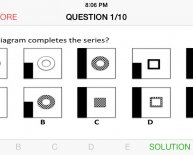
Logical Reasoning test tips
Logical Reasoning comprises 2 out of 4 sections on the scored portion of the LSAT. These 7 tips will help you to master this important section.
1. Use the order of difficulty to your advantage.
Work through the first 10 questions as quickly as possible. They're the easiest, so don't double-check and triple-check your answers on them just because you're a perfectionist. Instead, trust your instincts on these and move on. Build up a "time bank" by tackling these quickly so that you'll have a few minutes left over at the end of the section to go back to tougher questions that you weren't 100% sure on.2. Manage your time wisely.
Because questions 1-10 tend to be easier, try to complete each one in under 1:20. This will give you extra time for the more difficult questions that come later.
3. Thoroughly read the stimulus.
Although passages in Reading Comp talk about concepts and use terminology you won't need to comprehend fully on an initial read, Logical Reasoning is different. You'll have to measure every word in both the question stem and the stimulus. In my experience, test-takers often read too quickly and gloss over details, which causes the majority of errors here.
4. Remember the topic of the stimulus doesn't matter.
This is especially important to remember when it comes to questions dealing with science and other technical topics (which often puzzle future lawyers who studied the humanities in college). In fact, if you're able to put aside your dislike and disinterest of the topic, you'll see that the connections between the premises (evidence) and conclusion in such question are often more straightforward than in other questions.
The best way to deal with tough scientific questions is to ignore the topic itself. Analyze the connection between the evidence and conclusion.
5. Eliminate all words that are irrelevant to the argument.
Even though you need to comprehend all the words in the stimulus, they're not all important. The only words you'll need to deal with are the ones that make up the evidence and conclusion.
Take a look at this:
Burritos are generally made with several ingredients including, but not limited to: ground beef, tomatoes, onions, and tortillas. No two burritos are made with exactly the same combination of ingredients. Thus, you can tell any two burritos apart by tasting them. The opening line of this stimulus wasn't evidence, and it wasn't conclusion - it was simply the argument's introduction, and didn't play any meaningful role in terms of logic. You don't need to worry about it once you realize this.6. Study smarter.
When you're marking down your answers on practice questions, try to distinguish between questions where you were sure of the answer and those where you were simply guessing. Do this even when you're "almost certain." When you're not 100% sure that your answer is correct, mark it with a "/". For example, if you narrow down the answer to either "B" or "C" (and you've crossed-off "A, " "D, " and "E) mark the answer as "B/C." You might even put what you consider to be the better of the two down first. If you liked "C" better than "B, " you could mark it on your answer sheet as "C/B."
This technique will help to track your progress more closely and determine which types of questions to focus on.
7. Try not to diagram Logical Reasoning questions too often.
It's often a good idea to diagram stimuli involving multiple conditional statements that can be linked in some way. Sufficient Assumption questions, Must Be True questions, and Parallel Reasoning questions often fall into this category. As you become more familiar with Logical Reasoning questions, you won't feel the need to diagram as often.

















